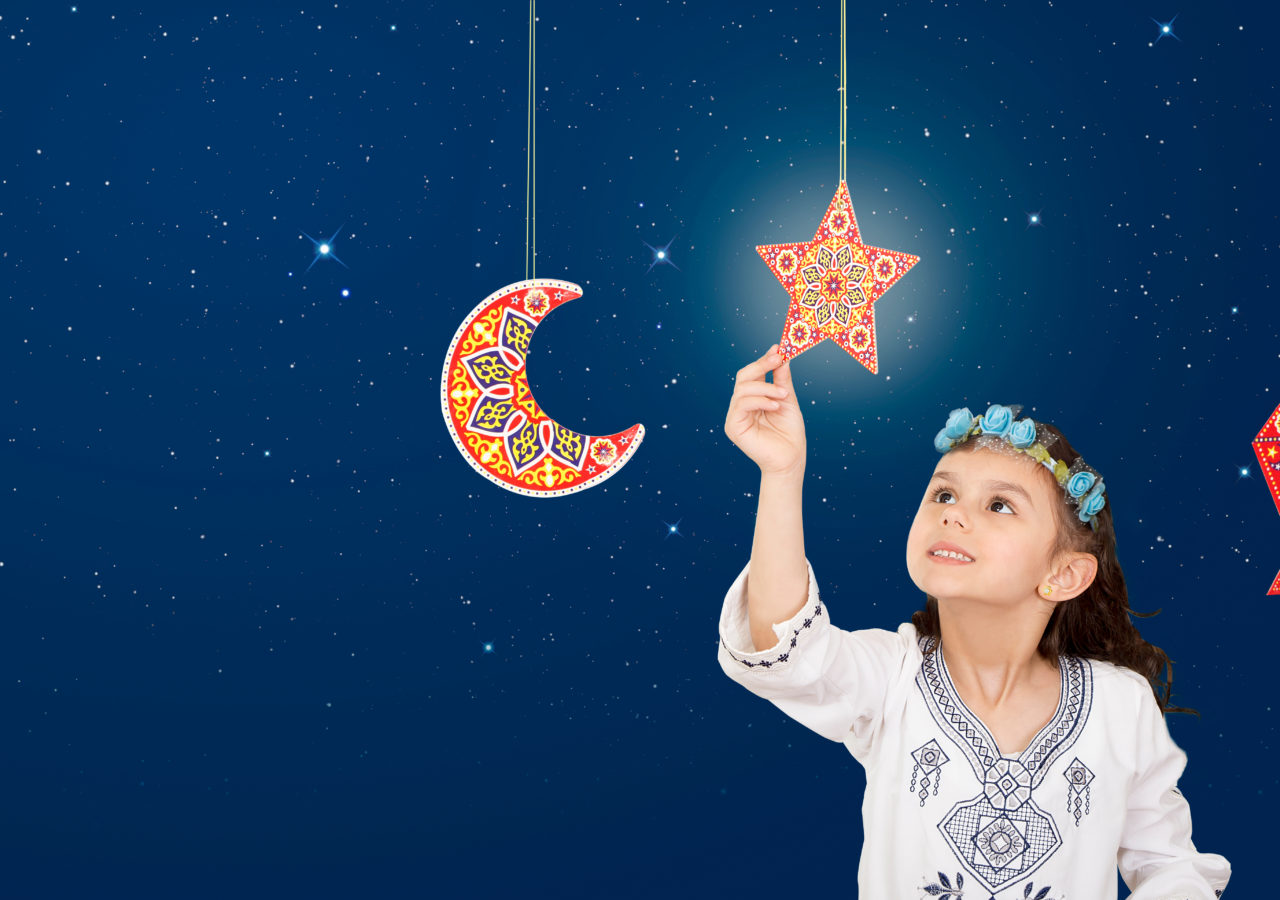Laila is worried about missing lunch with her friends at school this year and isn’t sure where she will go during that time. She’s worried about feeling left out, getting hungry and thirsty and uncomfortable. She wonders what the point of fasting is

The family is excited as the Ramadan moon looms. There is great anticipation. Mama anxiously considers how she’ll cope with work and childcare commitments while fasting, Baba wonders how he’ll manage the tiredness which often accompanies the holy month. Teens are revising for important exams during this time of year and littler children will be fasting, often with eagerness, for the first time.
Many Muslims prepare food and shopping before the month commences to free up the days of barakah for contemplation and worship. Preparations are often done ahead of a big family get together for Iftar, one highlight of the month of Ramadan for many Muslim families.
Parents and children start to decorate their homes, maybe have a prayer corner and make changes to the family routine to facilitate the start of the month and create a distinct spiritual and inviting atmosphere at home.
Laila’s curious little voice pierces through the excitement and scuttling as she asks: ‘But why do we even need to fast?’
Sensing the apprehension in her voice, Baba sits Laila down and starts to explore her question a little bit more. Laila is worried about missing lunch with her friends at school this year and isn’t sure where she will go during that time. She’s worried about feeling left out, getting hungry and thirsty and uncomfortable. She wonders what the point of fasting is. She’s heard it’s a test, but it seems a mean one. Laila really just wants to fast forward to Eid so she can celebrate with her cousins, get some presents and things can be normal again.
Laila’s father acknowledges her worries. Change can be scary for little people and he realises he hasn’t really discussed her impending first fast with her. In amongst the decorations, the food and the anticipation, Laila’s preparation had been overlooked.
He sits by her, smiling gently and tells her that we fast because Allah has ordered us to fast. In the Prophet’s sermon welcoming the holy month, he describes the fasting Muslim as being an honoured guest of Allah. And guest are appreciated, respected and showered with gifts. He reminds Laila about the previous week when he refused to let her play in the garden when builders were working, using big heavy tools and creating lots of noise and fumes. ‘You cried and protested, my dear, but I wanted to protect you from harm’. He also reminded her of his insistence that she brush her teeth every day. ‘It is sometimes boring but I want to make sure you have healthy teeth you can enjoy for longer’. He describes Ramadan as a little like this. We don’t know exactly why we need to fast, but we know our creator and our God knows what is good for us, we trust His judgement, even when we may not fully understand it.
He explains to Laila that we are understanding more of the benefits and wondrous secrets of fasting as time goes on. That many religions have some kind of fasting ordained. And that a Japanese scientist called Yoshinori Ohsumi won the Nobel Prize in 2016 when he discovered that fasting makes our cells, the building blocks of our bodies, clean up and repair themselves. ‘This was fascinating because it showed one of the reasons why fasting is so good for us. Many people now, non-religious people, have some fasting days to heal their bodies, slow down ageing and feel better.’
He describes how snacking, while being so commonplace, is not actually good for us and science supports giving our bodies, our teeth and our digestive systems a break.
‘In addition to the impact on the body,’ He adds, ‘fasting makes us appreciate our food, our bodies and our blessings more. Sometimes we need to lose something to help us appreciate it. When we regain it back, we understand its value and importance and enjoy it more. Ramadan is a little like this.’
‘The month of Ramadan also helps us feel strong and patient. People who smoke need to give this up during the daylight hours. ‘Lots of people are addicted to coffee like me,’ he laughs. ‘And I cannot have it in the daytime. It is hard to start with, but willpower is a muscle, and without training it stays weak. When we practise every day for 30 days, we are amazed at our inner strength and willpower. It gives us confidence and a sense of pride.’
Laila’s dad explains that Ramadan can feel uncomfortable and yes, a little like a test. But we are more than a body and comfort keeps our souls dormant and lazy. Being uncomfortable and denying the desires of our body, like we do every day when we wake up for Fajr in the early morning, still tired, helps wake up our soul. The soul is what makes us enjoy Ramadan. All our souls are connected to Allah who created them. He knows what awakens our souls and what makes them feel happy. When our soul is close to Allah, through following His instructions, we feel happy. But people sometimes look for comfort and happiness and don’t follow His teachings. And they don’t get to taste this beauty.
Laila’s dad promises to approach her school before she starts fasting. There may be some changes they can make to her school day so she doesn’t feel so left out.
Religious beliefs are a protected characteristic in the UK under the Equality Act 2010. Schools are bound to have policies so he will explore the website to look for any relevant policies on inclusion and equality before he contacts the school. In fact, many schools appoint a designated equality lead. He will ask about this and possibly speak to her directly. He will express his wish to have Laila and her fasting encouraged, honoured and empathised with. He will offer to spare some of his lunchtimes and those of his wife to volunteer at the school to supervise the fasting children if staffing is short. This may require certain checks which take time so it is best requested early. It wouldn’t be fair for the fasting children to sit with the eating ones due to lack of space or provisions. He will ask that Laila is given respite during PE lessons, during which she can take part at a gentler pace, or help the teacher set up. He will look to brainstorm some ideas with the school and will encourage Laila to advocate for her needs too. Maybe she can request a quiet place to pray during lunchtimes.
Finally, Laila’s dad gives her a hug and reassures her that Allah doesn’t want us to suffer needlessly, but to grow. If she were to struggle or fall ill, she won’t be expected to carry on. The family are here to support her and hopefully the school will be too. He encourages her to speak to her friends, explain what Ramadan means to Muslims and maybe even give a talk to the class. Children like to find out about each-other’s cultures after all.
Laila looks more positive and reassured. Baba informs her that some foods like proteins keep us feeling fuller for longer. He will be waking her up for Suhur and encouraging her to eat protein like beans or eggs which will help keep her from getting hungry during the fasting day. The family can also try to shift the routine and take a nap in the afternoon to alleviate tiredness and hunger, especially during the school holidays. ‘It won’t be easy,’ he says smiling, ‘but it will be worth it. Allah wants to lift us higher and higher. He is granting us a pause button in the year where we can stop and think about our direction and our relationship with Him. So we are better, healthier and more connected to Him at the end of the fasting month. He says in the holy Quran:
‘O you who believe! fasting is prescribed for you, as it was prescribed for those before you, so that you may become righteous. ‘(Al-Baqara, 2:183)


